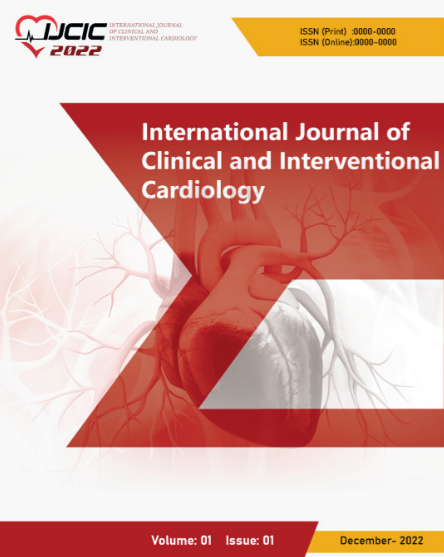Observation of Dietary Habits among Diagnosed Ischemic Heart Disease Patients
DOI:
https://doi.org/10.61561/ijcic.v1i1.5Keywords:
Ischemic, Heart Disease, Cardiac, DietaryAbstract
Introduction: Ischemic heart disease (IHD) remains a major health concern globally and is particularly prevalent in low- and middle-income countries, including Bangladesh. Dietary habits play a crucial role in the prevention and management of IHD. This study aimed to observe the dietary habits among diagnosed ischemic heart disease patients in Bangladesh.
Methods: This cross-sectional descriptive study was conducted at the Department of Cardiology, Rangpur Medical College, Rangpur, Bangladesh, involving 258 IHD patients. Data was collected using a pre-tested structured questionnaire, and participants were classified into three groups based on their dietary habits. Informed consent and ethical approval were obtained.
Result: The majority of respondents (65.9%) were aged 55 years and above, with a mean age of 58.12 years. Regarding education, 49.2% had completed their SSC or equivalent, and 28.7% had completed their HSC or equivalent. Most participants (65.1%) had a monthly income of less than 20,000 taka. Among the total, 22.48% were smokers, and 77.52% did not smoke. Only 7.36% followed a vegetable-prone diet (Group-1), 28.68% adhered to a middle-class food diet (Group-2), and the majority, 63.95%, consumed a fatty food diet (Group-3). While 39.53% did not consume vegetables daily, 31.01% had adequate servings, and 29.46% had inadequate servings. Only 25.97% had a daily fruit intake, all with inadequate amounts, and 74.03% did not consume fruits regularly. None of the respondents had an adequate fruit intake. Finally, 68.60% of respondents reported consuming extra salt, while 31.40% did not.
Conclusion: The study highlights the need for targeted interventions to promote healthier dietary habits among IHD patients in Bangladesh. By implementing evidence-based strategies and fostering multi-sectoral collaboration, it is possible to improve IHD prevention and management in this population.

Downloads
Published
How to Cite
Issue
Section
License

This work is licensed under a Creative Commons Attribution-NonCommercial-NoDerivatives 4.0 International License.





